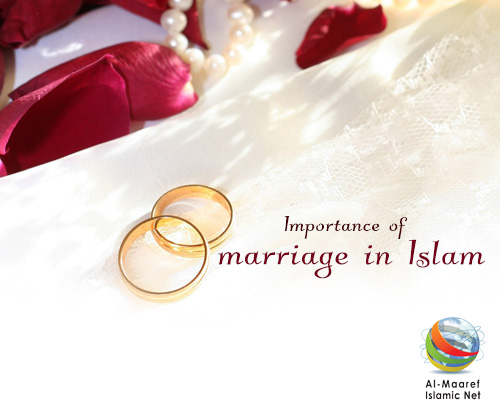Continuity of the Family
It is ascribed to Imam Jaafar Al-Sadik (God’s peace bestowed upon him) that he said, “The Most Glorious and Reverent God likes the house where there is a wedding but detests the house where there is a divorce. And nothing is more hateful than divorce is.”1
The divorce is a destruction for a building which The Most High God likes and spurs the people on it i.e. marriage. Even though the marriage is liked by The Most High God and even though it is one of the causes of the perfection of religion and a fortress against the sins, The Most High God did not want to oblige the people to abide to this alternative or to fortify by this fence. This is so because the obligation may bring about a lot of negative consequences which make the human being hesitate a lot before entering the marriage cage because he will not be able to get out of it. In addition, the obligation contradicts the state of affairs and overlaps the real problems which the wife and the husband may fall in and which they may find no solution for but separation.
Perhaps these points in addition to other points illustrate the divorce’s not being religiously forbidden and the reason of keeping the door open before this alternative. But at the one and the same time, The Most High God directs the human being to turn away from the divorce and not to resort to this alternative as much as this is still possible.
It is ascribed to Imam Al- Baker (God’s peace bestowed upon him) that he said, “God’s prophet (God’s prayers and peace bestowed upon him and his Household) said, ‘Jibrael (God’s peace bestowed upon him) recommended me with the woman to the extent that I thought that she should not be divorced but for a demonstrated abomination.’”2
The Most High God stressed the hatefulness of divorce to the extent of regarding it as the most hateful issue as is mentioned in the previous narrative ascribed to Imam Al-Sadik (God’s peace bestowed upon him). Even more, there are certain narratives which do not stop at the hatefulness of divorce but exceed this to declare the hatefulness of the one who chooses and performs it.
It is ascribed to Imam Al-Sadik (God’s peace bestowed upon him) that he said, “Nothing among the issues which God permitted is more hateful to Him than divorce is. And God hates the moody divorcer.”3
Although the alternative of divorce is not religiously forbidden, one must consider it seriously and turn away from it as much as this is still possible. Even more, one must not have it in mind at all, so that it will not turn to be the easiest solution which is resorted to in order to escape from any problem in which the husband and the wife may fall.
From the Causes of the Divorce
1- Not Abiding to the Sacred Doctrine
The Most High God put the laws to organize the marital relationship and made it in the form which best guarantees the happy and successful marital relationship. When the human being turns away from these religious limits and trespasses them, then he/ she threatens the whole marital life.
From here, it is necessary for the wife to get acquainted with the marital rights and with the etiquettes of the relationship with her husband so as to effectuate a state of invulnerability which protects the building of the family from cracking. We are going to illustrate this in details under the title of avoiding the causes of divorce.
2- The Faults
The wrong evaluation which results from not knowing the partner, his peculiarities, what he likes, and what he hates or the inability to harmonize with him in spite of knowing his inclinations and his peculiarities may result in tension and doing faults, thus endangering the marital life. Therefore, being well acquainted with the partner may help in understanding the behaviors in a way effectuating harmony.
How to Handle Them?
1- Taking into Consideration the Rights and the Etiquettes
There are certain rights and etiquettes which must be realized and taken into consideration. Abandoning these rights and not realizing these etiquettes will keep the door widely open in front of misunderstanding and will put the building of the family face to face with danger. Then, what are these rights and etiquettes?
Rights and Etiquettes in the Relationship with the Husband
It is ascribed to The Noblest Prophet (God’s prayers and peace bestowed upon him and his Household) that he said, “The one, among all the people, who has the greatest due on the woman is her husband…”4 And it is also ascribed to him in another narrative that he (God’s prayers and peace bestowed upon him and his Household) said, “The woman will not be able to pay the due of The Most Glorious and Reverent God until she pays the due of her husband.”5 Moreover, it is ascribed to him that he (God’s prayers and peace bestowed upon him and his Household) said, “The woman’s struggle for God’s sake is fulfilled by her being a good wife.”6
First: Fulfillment of Her Husband’s Needs
The woman must grant her husband his need i.e. obeying him as regards the issue of the private relationship between them. If she refuses to do so, God becomes displeased with her till she pleases her husband.
It is related that when one woman asked God’s prophet (God’s prayers and peace bestowed upon him and his Household) about the husband’s due on the woman, he (God’s prayers and peace bestowed upon him and his Household) answered her, “It is to grant him his need even if [he asks for it] over a saddle…”7
Second: Beautifying Herself and Endearing to Her Husband
By beautifying, it is meant to turn away from what repels the husband and to show him a comely composure. When Imam Al-Khomeini (May his secret be sacred) talked about the recalcitrance of the woman in his book Editing the Means, he mentioned “the non removal of the repulsions that contradict his enjoy with her; even more, it is not to clean and adorn herself in spite of the husband’s need for this”8 as a part of recalcitrance.
In addition, it is ascribed to Imam Al-Sadik (God’s peace bestowed upon him) that he said, “…The wife can not, as regards the relationship between her and her husband, do without three characteristics. She must up keep herself from every abomination, so that his heart will be at ease with her in weal and in woe. She must also attend to him, so that this will plead for her if she does something wrong. And she must show love to him through being fascinating and comely looking in his eye.”9
Third: Preserving Her Husband’s Money
The woman must feel responsibility for her husband’s money i.e. she must not spend it lavishly on one hand and must not dispose of it without his permission on the other hand. There are many narratives which refer to this. It is ascribed to Imam Al-Sadik (God’s peace bestowed upon him) that he said, “…and does not give out anything without his permission. If she does so, she is going to bear the sin and he is going to be granted the reward.”10
Fourth: Not Angering and Hurting Her Husband
It is ascribed to The Prophet (God’s prayers and peace bestowed upon him and his Household) that he said, “Woe to the woman who angers her husband. And blessed be the woman whom her husband is pleased with her.”11 It is also ascribed to him (God’s prayers and peace bestowed upon him and his Household) that he said, “He who has a wife who hurts him has God not accepting her prayer and none of her good deeds, even if she fasts all her lifetime, till she pleases him.”12 In addition, it is ascribed to God’s prophet (God’s prayers and peace bestowed upon him and his Household) that he said, “The best woman among the women of my nation is the woman who, when she notices that her husband is angry, devotes herself to grant him his demands and says to him, ‘My eye will not sleep till you are pleased with me.’”13
Fifth: Not Getting Out of His House without His Permission
It is related to Imam Al-Sadik (God’s peace bestowed upon him) that he said, “There is no expense for the woman who gets out of her house without the permission of her husband till she is back at her house.”14 Imam Al-Khomeini (May his secret be sacred) considers “the wife’s getting out from her husband’s house without his permission” to be from the wife’s recalcitrance.
2- The Solution after Getting in the Problem
If any problem takes place between the husband and the wife, they have in the beginning to look for the solution inside the house without moving it outside the house in a way which leads to enlarging and complicating it more and more. The Most High God says, ﴾And if a woman fears cruelty or desertion on her husband’s part, there is no sin on both them if they make terms of peace between themselves; and making peace is better. And human inner selves are swayed by greed. But if you do good and keep away from evil, verily, Allah is ever All Acquainted with what you do﴿15.
When the husband and the wife are not able to solve the problem to arrive at mutual understanding and continuity of the marital life in a proper manner, here rises the role of the righteous external factors [the arbitrators] to help in solving the unsettled problems.
The Most High God says, ﴾If you fear a breach between them twain (the man and his wife) appoint two arbitrators, one from his family and the other from hers; if they both wish for peace, Alalh will cause their reconciliation. Indeed Allah is Ever All Knower,Well Acquainted With All Things﴿16.
This verse does not state a specific person like the father, the uncle, or anybody else… It is so perhaps in order to keep the door open before choosing the one who is the most wise, the most righteous, and the most capable of recognizing the nature of the problem and presenting a solution for it and influencing the person concerned i.e. the husband if he/ she [the arbitrator] is from the husband’s family or the wife if he/ she from the wife’s family.
The Most High God wants the family [that of the husband or the wife] to be a positive factor which helps in reforming the marital life and not a negative factor which adds to the complication of the problem. Imam Al-Khomeini (May his secret be sacred) said in this course, “When disagreement takes place between the husband and the wife to the extent that it may lead to dissension and separation and to the extent that their problem reaches the governor, he must send after two just arbitrators, one on his behalf and one on her behalf, in order to reconcile them and in order to put an end to the dissension in the way they regard it to be the most proper whether in joining or separation.”17
“The two arbitrators must examine the situation and the cause of this dissension between the husband and the wife, and they must try to reconcile them. The judgment the formers arrive at and agree on is applicable on the husband and the wife who must be content with the arrived at judgment in condition it is religiously permissible, such as: if they impose on the husband to accommodate his wife in a specific country or in a private residence or at her parents’; that his mother or sister does not reside with her even in separate resident; that he does not accommodate her fellow wife with her in the same house; that she be patient with him till he is able to offer her the dowry; that she pays back to him the credit he gave to her; and so on. On the other hand, the arrived at judgment is not accepted if it is not religiously permissible, such as: not giving the fellow wife her dutiful expense or other rights; giving the wife the permission to get out of her husband’s house whenever and wherever she wants; and so on.”
Divorce: The Authority of the Husband
The divorce’s being the authority of the husband does not authorize him to tyrannize over the wife and to misuse it. This right is a trust consigned to the husband about which The Most High God is going to ask him on the Day of Judgment.
It is related in the narrative ascribed to Imam Al-Sadik (God’s peace bestowed upon him) that he said, “It was related to The Prophet (God’s prayers and peace bestowed upon him and his Household) that Abou Ayyoub wanted to divorce his wife, so God’s prophet (God’s prayers and peace bestowed upon him and his Household) said, ‘Divorcing Om Ayyoub is a sin.’”18
Retaining Her on Reasonable Terms or Divorcing Her with Kindness
The husband must choose to continue the marital life yet within the frame of correct and healthy environments, thus retaining his wife on reasonable terms and treating her amicably. However, if the problem reaches a blocked way and he decides to divorce her, then he has to divorce her with kindness.
The Most High God says, ﴾The divorce is twice, after than either you retain her on reasonable terms or release her with kindness. And it is not lawful for you (men) to take back (from your wives) any of your dowry which you have given them, except when both parties fear that they would be unable to keep the limits ordained by Allah. Then if you fear that they would not be able to keep the limits ordained by God, then there is no sin on either of them if she gives back (the dowry or part of it) for her divorce. These are the limits ordained by Allah, so do not transgress them. And whoever transgresses the limits ordained by Allah, then such are the wrong doers﴿19.
It is not permissible to retain the wife in order to hurt her. Moreover, it is not permissible to deal harshly with her, in order that she will give up her dowry or in order that he will avenge himself from her in one way or another.
The Most High God says, ﴾And when you have divorced women and they have fulfilled the term of their prescribed period, either take them back on reasonable basis or set the free on reasonable basis. But do not take them back to hurt them; and whoever does that, then he has wronged himself. And treat not the Verse of Allah as a jest, but remember Allah’s Favors on you, and that which He has sent down to you of the Book (i.e. the Qur’an) and Al-Hekma (The Prophet’s Sunnah- legal ways- Islamic jurisprudence, etc) whereby He instructs you. And fear Allah, and know that Allah is All Aware of everything﴿20.
The divorce is a destruction of a building which The Most High God likes and spurs the people on it i.e. marriage. It is ascribed to Abou Abdullah Imam Jaafar Al-Sadik (God’s peace bestowed upon him) that he said, “The Most Glorious and Reverent God likes the house where there is a wedding but detests the house where there is a divorce. And nothing is more hateful than divorce is.”
Though the alternative of divorce is not religiously forbidden, one must turn away from it as much as it is possible. Even more, one must not have it in mind at all, so that it will not turn to be the easiest way which it is resorted to in order to escape from any problem which the husband and the wife may face.
From the Causes of Divorce
1- Not abiding to the sacred religion
2- The faults and the inability to be in harmony with each other
Rights and Etiquettes in the Relationship with the Husband
1- The woman must grant her husband his need i.e. obey him as regards the issue of the private relationship between them.
2- The woman must beautify herself and endear to her husband. By beautifying, it is meant to turn away from what repels him and to show him a comely composure.
3- She must preserve his money i.e. she must have the sense of responsibility for her husband’s money.
4- She must not anger and hurt him.
5- She must not get out of his house without his permission.
How Are the Problems Solved?
If any problem takes place between the husband and the wife, they have in the beginning to look for the solution inside the house without moving it outside the house.
When the husband and the wife are not able to solve the problem inside the house in the proper way, here comes the role of the righteous external factors [i.e. the arbitrators] to help in solving the unsettled problems.
The divorce’s being the authority of the husband does not authorize him to tyrannize over the wife and to misuse it. This right is a trust consigned to the husband about which The Most High God will ask him on the Day of Judgment.
The husband must choose to continue the marital life yet within the frame of correct and healthy environments, thus retaining his wife on reasonable terms and treating her amicably. However, if the problem reaches a blocked way and he decides to divorce her, then he has to divorce her amicably as well.
1- How does Islam regard the divorce?
2- What are the causes of divorce?
3- What are the husband’s rights on his wife?
4- What are the methods which must be followed in order to reform the marital life?
5- Does the divorce alternative’s being the authority of the husband mean that the divorce is a sword held over the neck of the woman?
Asya ibnat Mouzahem
Sayyda Asya ibnat Mouzahem (God’s peace bestowed upon her) is the wife of the Pharaoh who lived during the lifetime of Prophet Musa (God’s peace bestowed upon him and upon our Prophet and his Household).
Everything was furnished for this woman to have the top materialistic life and to enjoy a luxurious life along with the provided servants, bond maids, jewels, adornments, and best quality clothes just for being the wife of the Pharaoh, Egypt’s governor, who was passionately in love with her and who was ready to fulfill any desire she had in order to honor her…
In spite of all of this and amid all these conditions which make it easy for the human being to be misled and corrupted and deviated from the right path, Asya ibnat Mouzahem (God’s peace bestowed upon her) turned away from everything. She turned away towards The Truth when she heard His call on the tongue of Prophet Musa (God’s peace bestowed upon him and upon our Prophet and his Household) who was brought up in her bosom and palace. She believed in him and believed his call, so Sayyda Asya (God’s peace bestowed upon her) was from the first ones who believed in the religion which Prophet Musa (God’s peace bestowed upon him and upon our Prophet and his Household) called to.
Sayyda Asya’s (God’s peace bestowed upon her) belief enraged the Pharaoh who was declaring himself to be God- God forbids! The Pharaoh was so enraged because the one who believed in Musa was not a stranger from him or just an ordinary person; she was his wife who had been living with him in his palace. As a result, he tried by all means to hide her belief from the people, so that his throne would not be shaken.
Yet, all his attempts failed since she cleaved to what she believed in, thus forsaking everything except her creed which was as firm as mountains are. At that, the Pharaoh decided to avenge himself from her and from her religion, so he ordered her to be crucified in order that she would be set forth as a lesson for all the people.
However, she tolerated the crucifixion by means of her strong belief, and she turned to be a martyr, the martyr of the true religion. Because of this, The Most High God praised her in His Noble Book in His Saying, ﴾And Allah has set forth an example for those who believe, the wife of Fir’aoun [Pharaoh] when she said, “My Lord! Build for me a home with You in Paradise, and save me from Fir’aoun and his work, and save me from the people who are Zalimun [polytheists, wrong doers, and disbelievers in Allah]﴿21.
She was an example for those who believed, men and women who have been learning from her the patience and the steadiness to the true religion till the last breath.
* Woman’s Value and Role. "Lesson eight". Produced and Published by: Al-Maaref Islamic Cultural Association. First Edition: August 2005 A.D. / 1426 of Immigration.
1- Al-Kafi [The Sufficient]/ Sheikh Al-Koulayni/ Part Six/ Page 54.
2- Man La Yah’dourohou Al-Fakih [He Who Has No Jurisprudent to Refer to]/ Part Three/ Page 440.
3- Al-Kafi/ Part Six/ Page 54.
4- Meezan Al-Hekma [The Standard of Sagacity]/ Part Two/ age 1184.
5- Moustadrak Al-Wasael [Making Up for the Means]/ Part Fourteen/ Page 257.
6- Al-Kafi [The Sufficient]/ Part Five/ Page 9.
7- Al-Kafi/ Part Five/ Page 508.
8- Tahreer AL-Waseela [Editing the Means]/ Part Two/ Page 305.
9- Bihar Al-Anwar [The Seas of Lights]/ Part Seventy Five/ Page 237.
10- Wasael Al-Shee’aa [The Means of the Shiite]/ Part Twenty/ Page 312.
11- Bihar Al-Anwar [The Seas of Lights]/ Part Seventy Three/ Page 363.
12- Bihar Al-Anwar/ Part Seventy Three/ Page 103.
13- Al-Kafi [The Sufficient]/ Part Five/ Page 514.
14- Tahreer Al-Waseela [Editing the Means]/ Part Two/ Page 305.
15- The Noble Qur’an/ Al-Nisaa [The Women] Chapter/ Verse 128.
16- The Noble Qur’an/ Al-Nisaa [The Women] Chapter/ Verse 35.
17- Tahreer Al-Waseela [Editing the Means]/ Part Two/ Page 306.
18- Al-Kafi [The Sufficient]/ Part Six] Page 55.
19- The Noble Qur’an/ Al-Ba’qara [The Cow] Chapter/ Verse 229.
20- The Noble Qur’an/ Al-Ba’qara Chapter/ Verse 231.
21- The Noble Qur’an/ Al-Tahreem [The Prohibition] Chapter/ Verse 11.




















